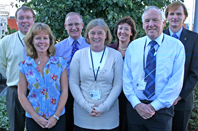New joint team to help schools
THE Anglican dioceses of Portsmouth and Winchester are joining forces to make their support for schools and colleges more effective.

The new Mission and Education team. (Back, l to r): director of education Tony Blackshaw, schools advisers Brian Hay, Lilian Weatherley and Chris Pritchard, (front, l to r): school surveyor Chris Finch, schools advisory officer Liz Hodson and further education adviser Gareth Denby
Education staff from both dioceses have come together to create a single team working throughout Hampshire, Bournemouth, East Dorset and the Isle of Wight.
The new ‘Mission and Education’ team is based in Portsmouth’s new diocesan offices in Peninsular House, next to the cross-channel ferry port. The seven staff will serve 145 schools – which teach more than 30,000 children - as well as all further education colleges and universities across both dioceses.
The two dioceses have been working together for many years, so the new joint working arrangement is a natural development of that reality.
The new arrangements will also help the Mission and Education team to support and advise all schools in both dioceses – not just Church of England ones.
Tony Blackshaw, who was Winchester’s director of education, has now been appointed director of education for both dioceses. And his team will include staff members who originally worked with each diocese.
Those staff, including Tony, have had to apply for jobs with the new joint education team. This has allowed the dioceses to appoint a team with the appropriate skills. Those skills include expertise in leadership and management of schools, religious education, collective worship and spiritual, social and cultural development, governor training and school buildings. That means a wider range of expertise will be available to all schools in both dioceses.
“There are two opportunities to promote learning based on Christian values through schools,” said Tony. “Firstly, there are our own church schools where children and young people can learn in the context of an explicitly Christian values framework.
“Secondly in the community schools, colleges and universities, we can work with others of good faith in developing approaches that are implicitly Christian. Not all our parishes have a church school, but most have a school or college, which we should also be engaging with. With the team we have assembled, we are able to offer a much stronger support to our schools and colleges across a much wider area.”
And Andrew Howard, Winchester’s diocesan secretary, said: “We have been working closely with Portsmouth for many years to provide a better service to our schools and this is a logical development in our collaboration. Just as parishes are encouraged to work together and share resources to be more effective in mission, so dioceses are increasingly looking to work with each other to deliver their shared responsibilities. The new team will be a major resource to both dioceses and to all our parishes as they work with schools and the children within them.”
The change was recommended by Portsmouth diocese’s Central Structures Review Group, which spent 18 months studying diocesan administration. It urged the diocese to abolish a raft of boards and committees to release staff from bureaucracy and put mission at the top of the diocese’s agenda. And it also recommended working with neighbouring dioceses in both IT and accountancy, as well as education. Those changes were agreed by Portsmouth and Winchester’s diocesan synods – their major decision-making bodies - in the summer.
A regional IT manager is being recruited to serve Portsmouth, Winchester, Guildford and Chichester dioceses. And the diocese is working towards joint accountancy arrangements with Winchester and Guildford dioceses over the next 18 months.
Michael Jordan, Portsmouth’s diocesan secretary, said: “These joint arrangements were thought to be the most effective way of using our resources. It’s not about saving money or cutting back on overall staff numbers – it’s more about how dioceses can pool their expertise in a limited number of specialist areas to provide a more effective service to parishes, and the wider society.
“It also doesn’t suggest any kind of future takeover of any one diocese by any other. Each diocese is choosing to work together in this limited way, but will still retain control over all the work that happens in its name.”
The Mission and Education team is just one of four new sections working as part of Portsmouth’s central staff team after the reorganisation suggested by the Central Structures Review Group. The other sections based at the diocesan offices in Peninsular House are Mission and Resources, Mission and Society and Mission and Discipleship.